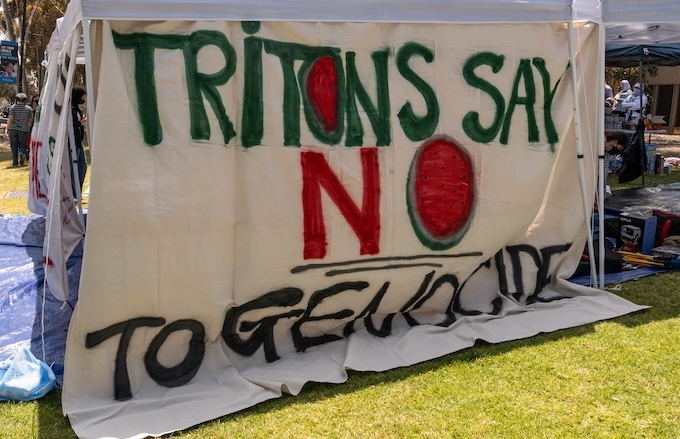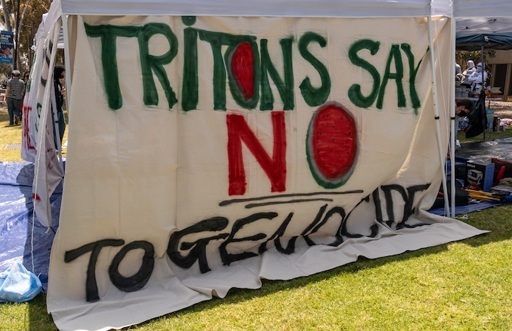

Encampment Protest at the University of California, San Diego, May 1, 2024. Photo by author.
Is it antisemitic to protest the State of Israel for its military occupation of Palestinian territory and its policies toward Palestinians that deny them basic political rights, including the right of self-determination? Is it discriminatory toward Jews to critique the ideology of Zionism that justifies an exclusionary Jewish ethno-state in Palestine? For those defending freedom of expression and the right to assembly, the answer to these questions is a resounding “no,” but sadly university leaders across the country have admitted to an exception to these principles when it comes to Israel and Palestinians that has compromised the university as a space of free and open discussion of issues of public concern.
For the past 25 years, Israel’s promoters have sought to deflect criticism of Israel and Zionism as anti-Jewish animus. By the early 2000s, as Palestinians launched a Second Intifada against their Israeli military occupiers, a global critique of Israeli brutality in repressing Palestinians emerged as part of a discourse of resistance directed against Israel and Zionism. This discourse defined the State of Israel as a colonialist venture upheld by a racist ideology. The World Conference Against Racism held in Durban, South Africa in 2001 was a turning point in this critique and proved to be a forerunner to the charges of Apartheid levelled against Israel by groups such as Human Rights Watch and Amnesty International.
Confronted with this critique, promoters of Israel and Zionism argued that the specter of a “new antisemitism” was haunting the globe, but to support this claim, the meaning of antisemitism had to be expanded beyond its historically accepted definition as animus directed at Jews.
One individual centrally involved in promoting this idea was Kenneth Marcus, an official in the Department of Education in the early 2000s. Marcus was alarmed by anti-Israel protests on college campuses and successfully lobbied lawmakers to add protections to Jewish students under Title VI of the 1964 Civil Rights Act.[1] What was needed to make this campaign about new antisemitism effective, however, was an institutional change in the meaning of antisemitism such that protests against Israel and Zionism, nominally protected forms of speech and assembly, became racist violations against the civil rights of Jews. To the rescue came the International Holocaust Remembrance Alliance (IHRA).
Focused primarily on Holocaust education, the IHRA took up the cause of redefining antisemitism in 2005 and by 2016 adopted a “working definition” of the age-old concept. Although its definition emphasized antisemitism as hatred and prejudice toward Jews, the IHRA ignited controversy by clarifying the meaning of its definition with eleven examples of antisemitism*.* Seven of these examples do not focus on Jews at all but on questions related to Israel and Zionism and in this sense seek to delegitimize and even criminalize speech protected under the First Amendment.[2]
For example, the IHRA lists as antisemitism, “claiming that the existence of the State of Israel is a racist endeavor.” In this way, the definition enables Israel’s defenders to dismiss as antisemitic the comprehensive studies of Israel as an Apartheid state by the aforementioned Amnesty International and Human Rights Watch, along with Israel’s own human rights organization, B’tselem.
Two other examples from the list of eleven are also noteworthy. One calls out speech “drawing comparisons of contemporary Israeli policy to the Nazis.” The second castigates the use of symbols and images that associate Israel or Israelis with “blood libel” referring to the ancient myth that Jews killed non-Jews, mostly children and used their blood in Jewish rituals. Defenders of Israel have weaponized these two examples in the IHRA definition to portray Encampment protestors across the country as antisemitic bigots.
Across the country, Encampment protestors registered two very visible demands: an end to Israel’s genocide, and termination of the killing by Israel of now 20,000 children in Gaza. Israel’s backers, however, were quick to insist that calling for an end to Israel’s genocide in Gaza likened Israel to the Nazis by suggesting that both were perpetrators of humanity’s most heinous crime. Similarly, by seeking an end to the killing of children in Gaza and using imagery of Palestinian children murdered by Israel’s onslaught in Gaza, Encampment protestors were supposedly smearing Israel with an antisemitic blood libel harkening back to the Middle Ages.
None other than Benjamin Netanyahu exploited these claims about Encampment protestors in an incendiary speech on April 24, 2024.[3] “Antisemitic mobs have taken over leading U.S. universities,” he proclaimed, and without evidence, insisted that these mobs “attacked Jewish students and Jewish faculty.” More significantly, Netanyahu cast as “shameful” several university presidents who, according to the Israeli leader, failed to crack down on protestors whom he compared to Nazis at German universities in the 1930s. Tragically, in the aftermath of this blatant threat to campus leaders in the U.S. to punish Encampment protestors or else, campus presidents cowered before the Israeli Prime Minister and initiated violent and brutal crackdowns on Encampments across the country – including my own campus at the University of California, San Diego.
The right to free expression and freedom of assembly are two of the most hallowed rights in the legal and moral lexicon of the U.S and have become core values at U.S. universities. It would therefore be logical for University leaders to strengthen these rights in order to promote a vibrant campus environment based on open discussion and debate about issues of public concern such as Israel, genocide, and antisemitism. Instead, University leaders from Columbia to UCLA have allowed groups defending Israel and its ideology to weaponize the meaning of antisemitism and notions of discrimination under the Civil Rights Act to attack these rights to speak and assemble. The outcome of such attacks on rights of speech and protest across universities is a climate on campuses of surveillance, censorship, and the chilling of free expression. Interestingly, one of the drafters of the IHRA definition of antisemitism, Kenneth Stern, has denounced use of the definition to censor speech on college campuses, calling it “a travesty.”[4]
Unfortunately, the crackdown on Encampments and the surveillance and censorship that followed is only part of a broader and more draconian campaign to restrict students and faculty from criticizing and protesting injustice when it comes to Israel and the Palestinians.
Last month, the Trump administration demanded that campuses at the University of California agree to a broad overhaul in a sinister document entitled the “Compact for Excellence in Higher Education.” The Compact reflects how federal authorities are weaponizing both the IHRA definition of antisemitism and turning upside down the idea of discrimination under Title VI of the Civil Right Act. Campus leaders themselves, however, in tacitly accepting the IHRA definition of antisemitism to suppress Encampment protests, have played a disturbing role in enabling the Federal Government to intervene in the academic affairs of the UC. In a letter sent to UC President James Milliken, the UC Academic Council representing the Faculty Academic Senate from all ten UC campuses implored the Office of the President and the UC Board of Regents to reject demands in the Compact “that compromise institutional autonomy and academic freedom,” while similarly, the American Association of University Professors (AAUP) wrote: “The Compact violates core principles of academic freedom and freedom of speech.” [5] Regents at UC will supposedly decide whether to accept this “Compact” at a meeting scheduled for November 18-20.
Sadly, these attacks our rights of free expression and assembly are not limited to University campuses. Israel’s defenders have waged a successful campaign to pass a bill in California, AB 715, signed into law by Gavin Newsom, that ostensibly aims to “combat antisemitism in schools” but is inspired by the same kinds of antisemitism allegations afflicting university campuses. In seeking to curb the way educators in California schools will be able to teach on the issue of Israel and Palestine, AB 715 generated overwhelming opposition from teachers’ unions, civil rights groups, and education advocates across California. Such opposition, along with outrage by free speech advocates throughout the State and across the country has inspired the Arab-American Anti-discrimination Committee (ADC) to file a federal civil rights lawsuit against the bill as unconstitutional in the way it overturns basic rights guaranteed by the First Amendment.
Although the bill passed with bipartisan support and was signed into law by the Governor, it is possible that the legal action initiated by the ADC may very well have something unexpected on its side.
On October 25th, the U.S. Court of Appeals in Boston, struck down a lawsuit brought by a pro-Israel group against MIT alleging that that the university, by failing to ban pro-Palestine protests on the campus, discriminated against Jewish students in violation of Title VI of the Civil Rights Act. The Appellate Panel hearing the case, made two key findings: 1) the pro-Palestine groups were exercising a First Amendment right; and 2) gathering on campus and setting up an encampment to protest were not antisemitic acts, but were instead protected speech. Juan Cole, history professor at the University of Michigan, described the decision as “one of the more important rulings in the history of the First Amendment.”[6]
How university leaders and lawmakers interpret this decision remains an open question but students, faculty, and human rights activists everywhere whose voices have been silenced over the past two years might now take some solace from this case. The imperative of free and open expression when it comes to issues of genocide on college campuses and beyond is more critical than ever.
Notes.
[1] https://www.nytimes.com/2024/03/24/us/politics/kenneth-marcus-college-antisemitism-complaints.html
[2] https://holocaustremembrance.com/resources/working-definition-antisemitism
[5] https://senate.universityofcalifornia.edu/_files/reports/council-chair-to-president-council-statement-ucla-demand-letter.pdf https://www.aaup.org/sites/default/files/2025-10/Letter-AAUP-to-OGC-Compacts.pdf
[6] https://www.juancole.com/2025/10/227621.html
The post Antisemitism, Campus Censorship and Freedom of Expression appeared first on CounterPunch.org.
From CounterPunch.org via this RSS feed


